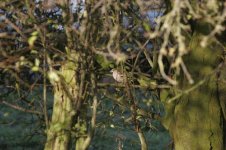senatore
Well-known member
I am a complete camera novice and am thinking of going down the DSLR route for birding photos( the digiscoping route has been ruled out as too fiddly and slow for me).I have seen the Nikon D50 mentioned in other threads and would like to know if it's any good?
I have read some of the DSLR threads and not really understood them but I have gleaned that I will need a telephoto lens and a converter ( is that the word) to get a anywhere near even a close bird.
If I bought the D50 body and say a Sigma 70 - 300 lens to go with it would I be an idiot? Is there any other combinations that I should consider?
My budget is £500 - £600.Any advice to prevent me adding to the list of poor purchases would be much appreciated.
Max.
I have read some of the DSLR threads and not really understood them but I have gleaned that I will need a telephoto lens and a converter ( is that the word) to get a anywhere near even a close bird.
If I bought the D50 body and say a Sigma 70 - 300 lens to go with it would I be an idiot? Is there any other combinations that I should consider?
My budget is £500 - £600.Any advice to prevent me adding to the list of poor purchases would be much appreciated.
Max.






